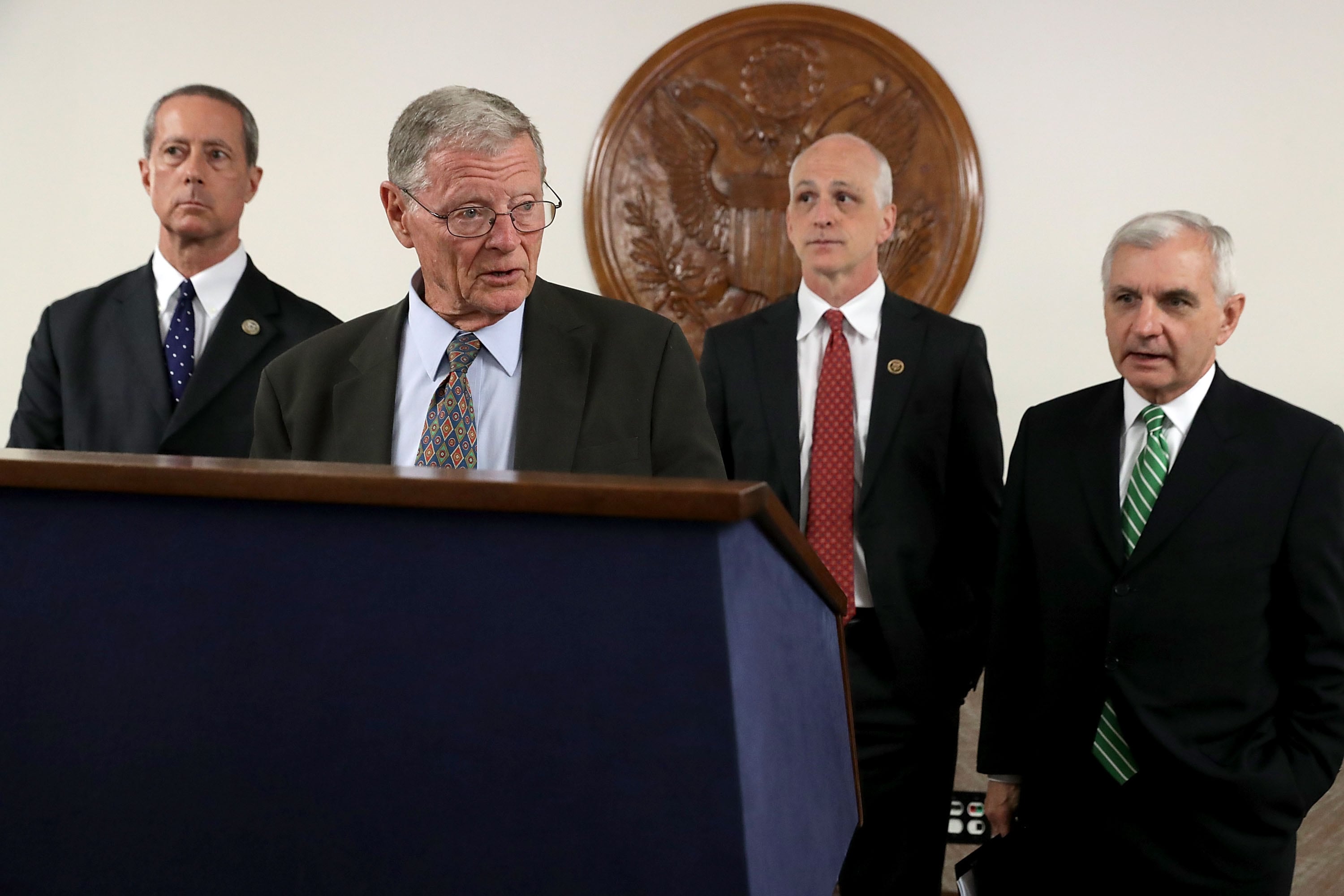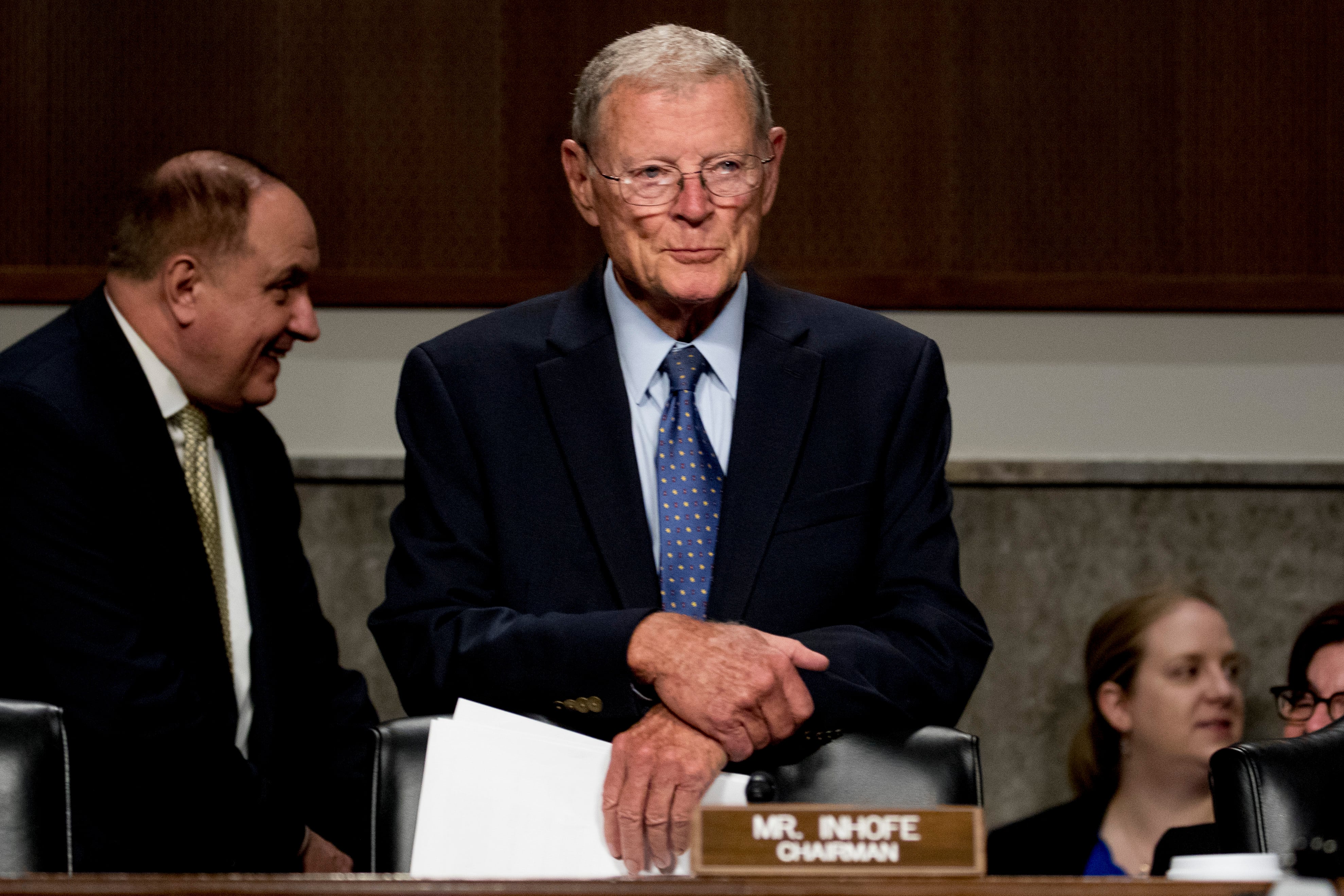WASHINGTON — With political gridlock stalling negotiations over the annual defense authorization bill, the chairman of the Senate Armed Services Committee on Tuesday unveiled plans for his backup “skinny” version of the legislation to ensure critical military programs continue uninterrupted into next year.
Sen. Jim Inhofe, R-Okla., said he remains hopeful a compromise can be found on the massive $738 billion defense policy measure in the coming weeks.
But he also argued that passing the basic military authorities contained within hundreds of additional pages of new programs and requirements — several of which have caused controversy within the House and Senate — is a critical responsibility of Congress, and cannot be jeopardized by that infighting.
“If for some reason we're not able to pass it, military operations will stop,” Inhofe said on the Senate floor Tuesday. “A skinny bill is simple. It extends necessary authorities for military operations, takes care of the service members and their families, and authorizes essential military construction and acquisition programs. That's it. That's one paragraph.”
The backup bill was drafted with guidance from Deputy Defense Secretary David Norquist. Its text was released Tuesday evening.
Whether Inhofe’s bid provides an emergency option for lawmakers on the authorization bill remained unclear Tuesday. He is expected to attempt to fast-track the bill to the Senate floor this week, bypassing his own committee.
RELATED

House Armed Services Committee Chairman Rep. Adam Smith, D-Wash., recently said negotiators will need to deal with the issue of restrictions on military construction funding (to prevent the president from using the money for his southern border wall project) for any legislation to advance in his chamber.
The stripped-down version of the annual National Defense Authorization Act — which has passed for the last 58 years — would remove nearly every other point of conflict for negotiators, so that it creates an easier path toward passage.
Because lawmakers worked over the last few weeks to reconcile the vast majority of differences between the House and Senate bills, Senate Armed Services Committee ranking member Jack Reed, D-R.I., said “it would be a shame to give up that progress,” adding that he’s hoping for an agreement.
Though Democrats have not assured Inhofe they would vote for it, Inhofe said he believes they ultimately will because that doing otherwise would be unpopular with voters. “They’ll vote for it," he said, adding, “They want to feed our troops.”
Here’s a look at what stays in and the key items that drop out of the skinny NDAA:
What’s in it?
- Military pay raise: The legislation calls for a 3.1 percent pay raise for troops in 2019, in line with the federal formula for troops’ pay and the largest annual increase for service members in a decade.
- Specialty pays and bonuses: Those include specialty pays for troops serving overseas, targeted re-enlistment bonuses for skilled troops, pay authorities for civilians working with the military in combat zones and other recruiting incentives.
- Counter-ISIS authorities: The new bill still ensures that certain ongoing overseas operations in the Middle East and Afghanistan remain funded, such as those targeting the Islamic State group.
- F-35 procurement: Authorizes the purchase of long-lead items “economic order quantities” for the F-35 Joint Strike Fighter from 2021 to 2023 to avoid higher costs associated with buying smaller quantities.
- LCS maintenance: Among the military construction projects included is work at Changi Naval Base in Singapore for the littoral combat ship, used to boost the U.S. presence in the South China Sea.
What’s not in it?
- Space Force: A new military service dedicated to space has been a top priority of the Trump administration, but senators have resisted White House calls for full Defense Department authority to create the new branch.
- “Widow’s tax” fix: Advocates have been pushing for a permanent fix to federal offset rules that take away tens of thousands in military benefits from some surviving spouses, but the price tag of the proposals — about $5.7 billion over 10 years — have made negotiations difficult.
- PFAS restrictions: Lawmakers considered new rules to limit the use of toxic firefighting chemicals at military bases and replace them in the coming years, but those provisions aren’t in the new bill.
- Nukes: Among a range of partisan differences on nuclear issues, the House bill would bar funding for the deployment of a low-yield variant of a submarine-launched warhead called the W76-2. It would cut the entire $19.6 million Defense Department request and $10 million Energy Department request for the program. Those wouldn’t be addressed.
- Transgender protections: Language from the House’s NDAA version that would roll back President Donald Trump’s restrictions on transgender military recruits had faced opposition in the Senate and is not in the stripped-down bill.
- Feres Doctrine: Provisions in the House’s NDAA version allowing troops to sue the government for military medical malpractice needed approval from Senate Judiciary Committee Chairman Lindsey Graham, R-S.C., who said he sees no need for the changes.
David Larter and Valerie Insinna of Defense News contributed to this report.
Leo covers Congress, Veterans Affairs and the White House for Military Times. He has covered Washington, D.C. since 2004, focusing on military personnel and veterans policies. His work has earned numerous honors, including a 2009 Polk award, a 2010 National Headliner Award, the IAVA Leadership in Journalism award and the VFW News Media award.
Joe Gould was the senior Pentagon reporter for Defense News, covering the intersection of national security policy, politics and the defense industry. He had previously served as Congress reporter.




